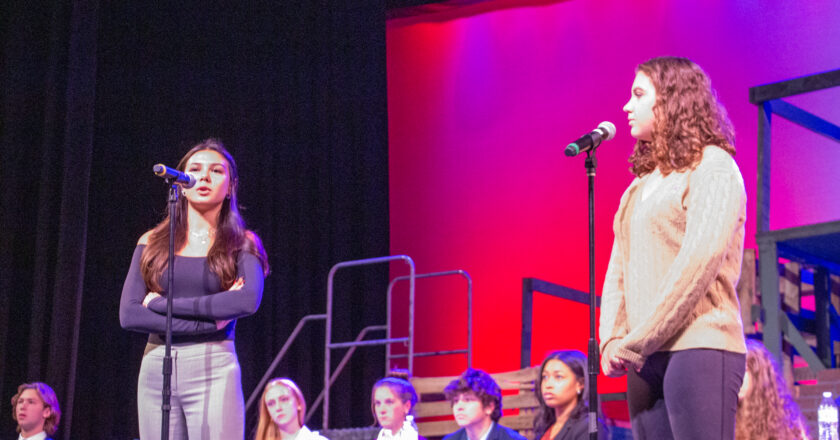On Nov. 3, 2022, students in history teacher Robert Moyer’s Power and Politics class participated in GA’s sixth annual history debate assembly, discussing topics ranging from immigration to gun laws to the wealth gap. Titled Exploring the State of Our Democracy: Freedom or Order?, the assembly involved pairs of students debating political issues from the perspective of maintaining either freedom or order.
This debate assembly is a central part of Mr. Moyer’s Power and Politics class. “Preparations really started from the first day of class because there were a lot of steps to the process,” Mr. Moyer said.
Much of the preparations leading up to the debate were student-led. Students first reflected on their personal political views to find their political compass, or political direction. The class then worked in groups to research different political ideologies, including liberalism, conservatism, libertarianism, and socialism.
To select topics for the debate, students discussed political issues that they perceived as important leading up to Pennsylvania’s 2022 general election. The topics the students came up with, and would eventually debate, were gun laws, the wealth gap, prisons and privatization, prisons and voting rights, foreign policy, immigration, and the future of our democracy.
“What I want to emphasize is that, when I say that it’s student-constructed, student-led, student-presented, it really is, as much as possible,” Mr. Moyer said. “I provide direction, I set up the structure, I choose the readings, but they picked their topics, they researched their issues, they wrote their speeches, they practiced and rehearsed and revised, and they presented.”
In addition to learning about current political issues, Mr. Moyer wanted students to build trust with their classmates and gain confidence in public speaking. “I wanted them to take away that they can actually get up and present a position in front of 500 people and do it really intelligently and and really well,” Mr. Moyer said. “I also want them to get a strong sense that they can trust their partner to work with them and work through issues because a lot of it is them rehearsing with each other.”
Senior Maria Petko, who participated in the debate assembly, reflected on her experience, saying, “I prepared a lot, but I was very nervous to walk up there onstage in front of the whole Upper School and debate an issue that’s also controversial.”
Ultimately, however, Petko felt that her preparation paid off. “It just felt really relieving and rewarding to have been able to get up there on stage, and I just felt that we did a really good job as a class,” she said.
Mr. Moyer echoes this sentiment. “What I really like about it is that it is the most genuine example I have of students leading their own education and pursuing really difficult and real life issues,” Mr. Moyer said. “They didn’t really shy away from anything, I mean, we discussed pretty controversial things, and I thought that we were able to do it in a civil and valuable way.”
As stated at the beginning of the assembly, the debate serves as a model for civil discourse in the community and an encouragement to students to learn more about current issues around them.
“I really do believe that exercises like this are essential to a democratic political system,” Mr. Moyer said. “Individuals have to be engaged, they have to be involved in the process of governing themselves, and that only comes from addressing the complicated issues that our nation and any nation faces.”

